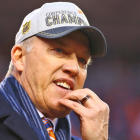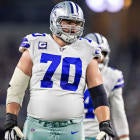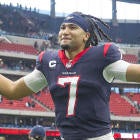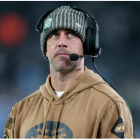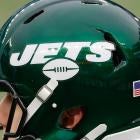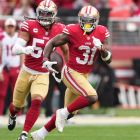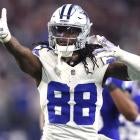John Elway, the Denver Broncos president of football operations, released a statement Tuesday night in which he expressed a desire for the NFL and his team to "move forward" from last weekend's demonstrations of unity during the national anthem.
President of Football Ops/GM John Elway to @BroncosTV on players’ National Anthem statements: pic.twitter.com/Q6F9rszh4x
— Denver Broncos (@Broncos) September 26, 2017
That's a pretty small graphic, so here's a full transcription of his comments:
I'm one that believes in standing for the National Anthem, and I've always believed that. I believe that this is the greatest country in the world. We are very fortunate to live here, but it's obviously not perfect. There are a lot of things that need to be corrected, and we will continue to work on those things. I'm one that really believes in standing for the flag. I understand the players and the way they felt from the comments that were made earlier in the week. They felt they had to go down and kneel and that's up to them. Hopefully as we go forward we can start concentrating on football a little bit more. Take the politics out of football. But I think last week was a good show of unity by the NFL and hopefully this week we can move forward.
Predictably in these stratified times, Elway's statement was met with applause in some corners and derision in others. But whether you agree with him about the national anthem and the flag or not -- and judging by the reaction across the country this past weekend and over the last year, there are many people who do and also many who don't -- it seems fairly clear from his statement that Elway has a misunderstanding of what the protests and, more recently, the "shows of unity" during the national anthem are actually about.
The protests are not about how Elway feels about the national anthem or the flag. They're not about how you feel about the national anthem or the flag. They're not even about how any of the players protesting feel about the national anthem or the flag. They're not about politics, the mixing of politics and sports, whether or not America is the greatest country in the world, or whether or not those of us who live here are fortunate to do so.
What they're about is systemic racism and the unequal treatment of people of color by police in America. This past weekend, they were also about the unalienable right to free speech, which last week was attacked by the President of the United States, who called for NFL owners to fire any "son of a bitch" that kneeled during the national anthem, and continued to do so even after Sunday's demonstrations. Those messages have been muddied of late as the protests during -- not of, but during -- the national anthem have become co-opted by the America's political media machine, but that is what they have been about ever since Colin Kaepernick started protesting during the national anthem last year.
While Elway's desire to strictly focus on football and to keep politics separate from what happens on Sundays and Mondays and Thursday in stadiums and on TV is shared by many people in the country, it's just not clear that he actually has any leg to stand on when it comes to demanding the separation of politics and sports. After all, it was barely six months ago that Elway wrote a letter to the Senate Judiciary Committee on Broncos letterhead recommending the confirmation of then-Supreme Court Associate Justice nominee Neil Gorsuch.
Hey @johnelway how come you said “take the politics out of football” today and not in, say, March https://t.co/1ROy2r4gpf
— Barry Petchesky (@barry) September 26, 2017
If he had shown a better understanding of the ideas behind players' demonstations during the national anthem and the goals of protests in general (which certainly go far beyond making a "show of unity" one time and then leaving well enough alone), or more awareness of his own history of mixing politics and sports, it might be easier to accept Elway's comments at face value. This statement, however, shows only a surface-level engagement with the protests themselves and a lack of awareness of how his own previous actions could be perceived when viewed in light of what he wants from protesting players.









